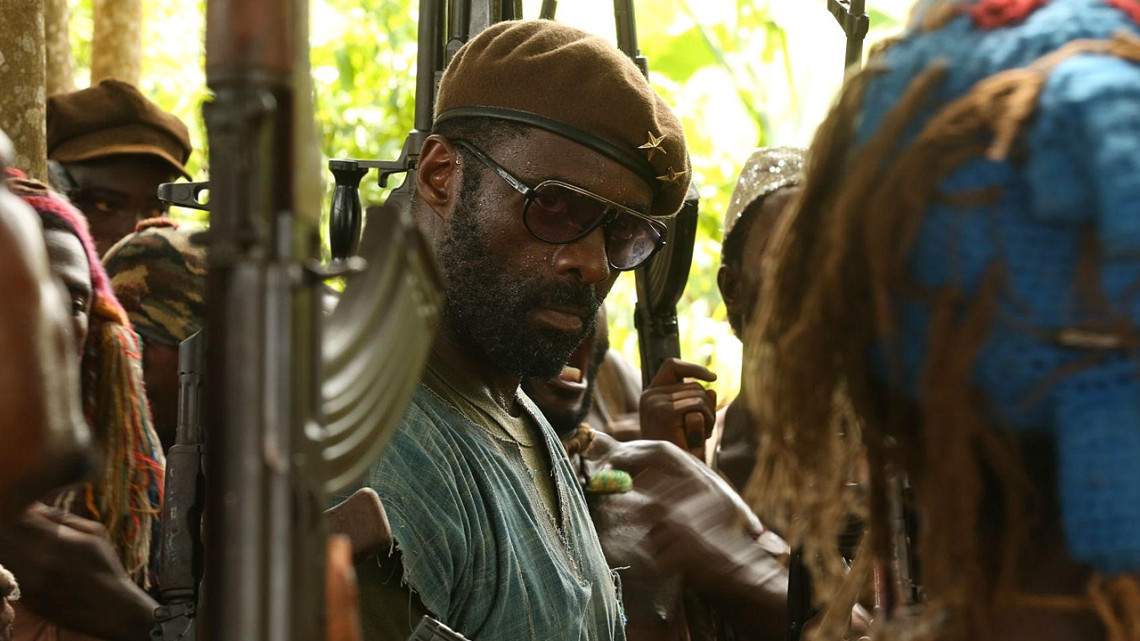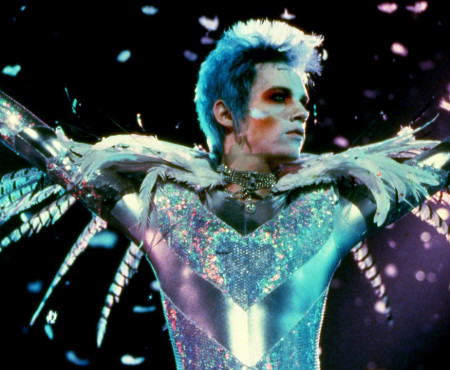There are two integral components to any review of Beasts of No Nation: Its identity as a piece of art and its identity as a product of an industry experiencing post-millennial growing pains. “Netflix presents a Netflix original film,” the credits tell us before ticking off requisite hat tips to the project’s other participating bodies. Strictly speaking, the picture’s release scheme – Netflix has premiered Beasts of No Nation on its streaming service and in theaters simultaneously – is nothing “new.” We’ve seen studios make their movies commercially available on VOD platforms and at the multiplex on the same day in the past (see 2014’s Veronica Mars). But Netflix put their bulk behind the movie’s formation. That, as they say, is a game-changer. Isn’t it?
Maybe. Maybe not. Maybe, going forward, this is how studios will make movies, and years from now, this kind of dual-platform strategy will be de rigeur. There are considerations to make if so; the challenges of transitioning movies from larger to tinier platforms already exist, but that challenge seems even more urgent for movies made to play on both at the same time. Yet none of these concerns address the pressing question of whether or not Netflix’s gambit has paid off creatively. Put bluntly: Is Beasts of No Nation any damn good?
Like many grimly drawn dramas about real-world barbarities – 12 Years a Slave is a recent touchstone of that cinematic persuasion – Beasts of No Nation brims over with technical and thespian merit, but most viewers will probably miss them because they’ll be too busy watching from the veil of a security blanket to notice. For the film’s architect, Cary Joji Fukunaga, the hideousness of his subject matter offers insufficient cause to flinch. Fukunaga’s oeuvre includes the first season of True Detective, a ship he seemingly knew had an iceberg in its future, which he abandoned to feed his impressive personal ambition, and 2009’s Sin Nombre, a movie that rips its material from the embrace of reality much as Beasts of No Nation does. Sin Nombre chronicles the struggles of a Mara Salvatrucha gang member and a Honduran family as they attempt to get out of Mexico and reach the safety of a new life in America. Beasts of No Nation follows a gang of another sort, a mercenary unit in Africa comprised largely of child soldiers led by a strutting, fearfully charismatic brute.
In both movies, the protagonists find surrogate families in the aftermath of the most awful circumstances imaginable. Agu (Abraham Attah), Beasts’ tragic, pint-sized hero, goes on the run in the jungles of an unnamed African country after his family is gunned down by soldiers under bogus justification. (Those two words are woefully inadequate at describing what happens in this particular sequence, but suffice to say, it’s horrible.) He’s swept up and ostensibly rescued by a company of guerilla soldiers, marching through the underbrush at the beck and call of their nameless leader, Commandant (Idris Elba). Plot is unimportant here. What’s important is the observational process of seeing Agu, a sweet, innocent boy thrust into a violent coming of age, molded into a killer bit by bit, layer by layer, as he undergoes initiation rituals, takes his first life, and takes his second, third, and more.
Beasts of No Nation is an acutely constructed tale of how easily evil can shape and influence people when it’s wrapped up in the guise of rectitude. Commandant dangles the promise of justice and bloody vengeance before Agu like a carrot. When the kid takes that carrot, we can’t even hold it against him. Commandant makes some seriously stirring proclamations about taking back the country from the various militant bodies responsible for killing and raping its people; slowly but surely, our chests fill with a surge of righteousness at Elba’s every word. He has us hook, line, and sinker. Imagining Beasts of No Nation sans his performance is impossible – he’s big, imposing, and ferocious when he needs to be, a stalking tiger prepped and ready to pounce, yet his convincingly charming qualities as a performer are even more important for establishing Commandant’s cult of personality. Elba is a routinely terrific actor, and his work in Beasts of No Nation ranks among the best he’s done to date. (Young Attah, meanwhile, manages to go toe to toe with Elba as his equal in acting. No wonder the kid won the Marcello Mastroianni Award at Venice this year – he’s absolutely incredible.)
But the character’s persuasive falsity is the film’s great trick. We want to fight the good fight he claims he’s fighting, but it’s bullshit: Commandant and the people he serves are just as awful as the vaguely outlined entities they’re at war with. That, perhaps, is the point Fukunaga seeks to make – he’s not fascinated with the banality of evil, per se, as much as with its sinister allure. Whether or not he needed to make a movie exploring the cinematic dark heart of Africa to make that point, however, is sort of up in the air. Is this the only perspective of the Mother Continent the movies are capable of taking? Bruce Beresford’s Mister Johnson, recently released on Blu-ray by the Criterion Collection, says “no,” but cinema frequently pictures Africa as a place of war-torn atrocity, and Fukunaga leans hard on that atrocity. Beasts of No Nation isn’t a gentle film, but viewers probably don’t need to read reviews to figure that out.
Viewers should, however, be warned that Fukunaga isn’t the type of filmmaker to look at exploded heads and flinch. He’s a quietly precise presence, capturing images of unspeakable horror with breathtaking clarity. Beasts of No Nation shows restraint in the sense that it rarely lingers on its viscera, but it does like to focus that viscera in the frame, if momentarily, before moving on; there’s so much of it, too, that the very act of watching the movie may have the side effect of corroding one’s faith in mankind. It’s a merciless movie, necessarily so and difficult to watch as a result. That’s how it should be, of course, out of respect to the gravity of its content. But neither the gruesome veracity nor the outstanding craft displayed in Beasts of No Nation make it any easier to endure. Endure it we must; movies of this caliber demand to be seen, whether on big screens or small.





















2 thoughts on “Why “Beasts of No Nation” Is Merciless and Difficult to Watch”
Pingback: BOFCA REVIEW ROUND-UP: 10/16/2015 | Boston Online Film Critics Association
Pingback: Review: Beasts of No Nation, 2015, dir. Cary Joji Fukunaga | A Constant Visual Feast